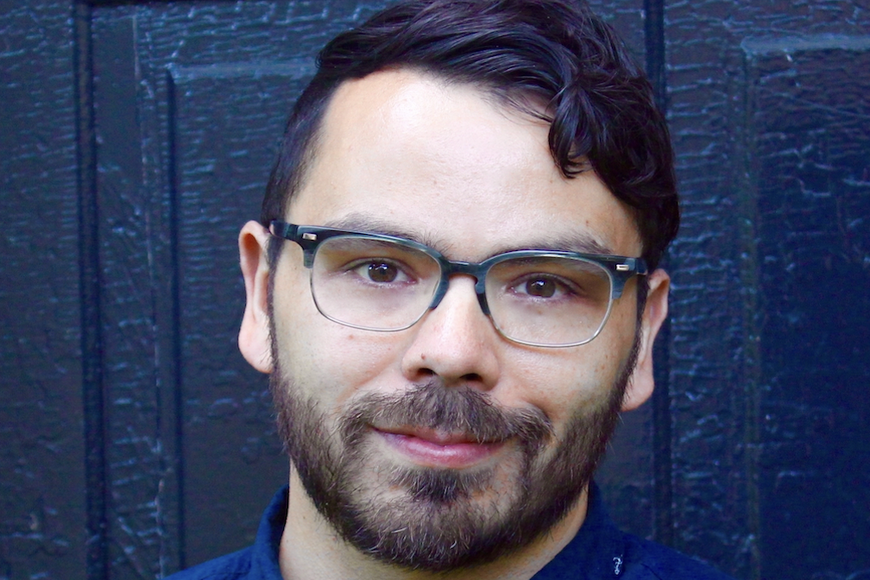Alumni Profile: Jason Ruiz
Jason Ruiz is associate professor of American Studies at the University of Notre Dame, where he is affiliated faculty with the Program in Gender Studies and the Institute for Latino Studies. He teaches courses in Latino studies, race and representation, border studies, and popular culture. Ruiz’s first book, Americans in the Treasure House: Travel to Porfirian Mexico and the Cultural Politics of Empire was published by the University of Texas Press in January 2014. He is a 2016 recipient of the Edmund P. Joyce Award for Excellence in Undergraduate Teaching at Notre Dame.
What brought you the University of Minnesota? What drew you to your chosen field? What do you love about what you do?
I attended the U as an undergraduate major in CSCL (Cultural Studies and Comparative Literature) and then, when considering graduate schools in American studies, found that it was still the best fit for me. I applied to about fifteen programs, including some at Ivy League schools, and got into them all, but felt that the U offered the most intimate and student-focused program I could find. I was looking for a program in which the students were supportive rather than competitive with one another.
I love American studies because it offers a framework for scholars to study any aspect of the American experience and encourages critical thinking about what it means to call something or someone “American.” It’s also been my intellectual home for my entire career because it fosters scholarship that’s rooted in activism and which takes a transnational approach. At the national level, it is also inspiring to see the American Studies Association (ASA) taking the lead on the Boycott, Divestment, Sanctions (BDS) movement, campus sanctuary, and other important issues.
How have your experiences at UMN prepared you for what you are doing now? How have they influenced your teaching, mentorship, research, or other pursuits?
Grad school in American studies at the U prepared me to go straight into my job as an assistant professor of American studies at the University of Notre Dame, where I am now an associate professor. I like to think that the U made me resourceful and scrappy because, at such a large university, I had to be self-motivated. Of course, the PhD program in American studies also challenged me to stretch and grow intellectually. But above all, going to grad school in American studies at the U provided a master class in mentoring. Even now, after publishing my book and earning tenure, I try to emulate the mentors I had at the U, especially Professor Kevin Murphy (with whom I still collaborate on a number of projects, by the way) but many others too, because I was the recipient of so much guidance and support.
What fond memories do you have from your time as a UMN graduate student? What do you miss about being on campus or living in the Twin Cities?
I miss the Twin Cities all the time! Although I was raised in the Chicago area, I feel like I really grew up when I moved to Minneapolis for college at the U. I have endless memories of the fun and agony of graduate school, but the image to which I always return is sitting at Anodyne Coffee (RIP) in South Minneapolis with my cohort-mate and friend Sonjia Hyon, reading, writing, thinking, talking, gossiping, complaining, and sometimes arguing. Those hours were actually crucial parts of my graduate education, and I was lucky to have Sonjia and others to learn from alongside the stellar faculty in AMST at the U.
How has your intellectual life evolved since you graduated? What projects are you currently working on?
The biggest evolution in my intellectual life is that I have more explicitly grown into a scholar of Latinx media studies. Right now I am researching my second book, which will focus on what I am calling “Narcomedia”—the countless books, TV shows, movies, and other pop culture texts that focus on Latinos/as and the global narcotics trade. I’m arguing that Narcomedia has naturalized the idea that Latinos/as and drugs go hand and hand and that we are the natural denizens of the narcotics underworld (even though Latinos/as are less likely than the American to abuse drugs). In particular, in the chapter I am currently writing, I am thinking about the recent resurgence of interest in Pablo Escobar and how it relates to the cultural figure of the Latino drug kingpin. So I have been fully immersed in narratives about drugs and crime for the past several months—things I never imagined would interest me but that I am now fascinated by. I plan on taking a sabbatical the year after next and will spend the year in Colombia, working on this book in a place that inhabits a terribly vexed place in the American imagination.
You recently published a book, Americans in the Treasure House: Travel to Porfirian Mexico and the Cultural Politics of Empire. What can you tell us about it?
My book, Americans in the Treasure House, argues that US economic imperialism in Mexico during the Porfiriato (1876-1911) was possible because of the cultural work of travelers, including writers, photographers, reporters, and even everyday Americans who related their travels back to people in the United States. I grew interested in this time period in graduate school, where I learned a lot about American empire but saw a dearth of work critically examining Mexico as an object of US imperialism. I hope that the book speaks to the fact that Mexico, too, became an object of the imperialist gaze in the late nineteenth and early twentieth centuries and that popular culture helped to frame it as such.
What advice do you have for current graduate students in your field?
My biggest advice for current graduate students is to carve out work that you love to do and have fun with it. Academia is rife with complaining and misery and I resolved early on that I would only pursue an academic career if I could have fun doing so. I have to say that I’ve done a pretty good job at doing so, even if some of the hurdles along the way have been maddening or frustrating. Sometimes people think this Pollyannaish, but I really do think that nothing as huge and life-consuming as a PhD is worth the effort unless you can have fun with it. One strategy is to try to remember that you have lots of options and are in academia because you want to be, not because you have to be. In no way am I saying to stop complaining—that, after all, is the sacred pastime of graduate students everywhere—but rather that you should make pleasure, including the pleasure that you can find in your work, a priority.
What books or blogs have you been reading recently? Any recommendations for our readers?
I read a ton for pleasure! My favorite book from last year was What Belongs to You by Garth Greenwell, but I also just finished (and loved) a similar book with the title—of all things—American studies. Both are about queer longing and untenable relationships and happened to be recommended by Professor Kevin Murphy. I also just read Colson Whitehead’s The Underground Railroad and found it moving—no pun intended.
For research purposes I am also reading (and watching) a bunch of sources about the international trade in cocaine and other drugs, everything from Miami Vice to Narcos and a lot of first-person accounts by CIA agents and other operatives. I am looking for how they narrate what happened between the United States and Colombia in the 1980s and 1990s, so I wouldn’t quite consider these texts enjoyable. As far as more academic fare, I recommend that everyone start reading the Radical History Review—of course, since I am the co-chair of its Editorial Collective.


